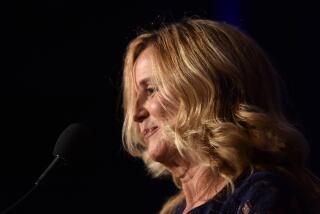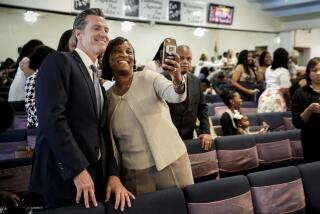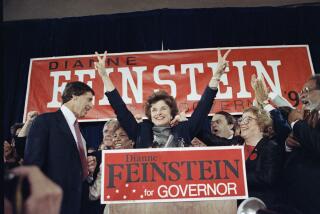The GOP wants to know why Feinstein didn’t come forward sooner with Kavanaugh allegation
Sen. Dianne Feinstein was one of four female senators who rode into Washington in 1992 amid a political backlash over the all-male panel that quizzed Anita Hill on her sexual harassment allegations against Supreme Court nominee Clarence Thomas a year earlier.
Now as the top Democrat handling the confirmation of Supreme Court nominee Brett M. Kavanaugh, the California senator finds herself in the middle of the political maelstrom over sexual assault allegations against another high court nominee.
Republicans accuse her of withholding the allegation until the most politically advantageous moment. Even some Democrats initially complained that she didn’t share the explosive information with them earlier.
Next week, Feinstein may have to lead Democrats into a hearing — if it takes place — with Kavanaugh and possibly his accuser, Northern California psychology professor Christine Blasey Ford, that will likely determine whether Kavanaugh goes to the high court or watches his confirmation fall apart amid the #MeToo movement over sexual misconduct.
Ford’s attorney said Tuesday that her client doesn’t want to appear at a Senate hearing until the FBI investigates, mirroring a request Feinstein has made. Feinstein and other Democrats haven’t decided whether they will attend if Ford doesn’t appear.
Democrats who earlier this month were frustrated that Feinstein wasn’t sharing with them Ford’s allegation are now rallying to their colleague’s defense as she faces criticism from Republicans as well as her Democratic opponent, state Sen. Kevin de León of Los Angeles, over how she handled the allegation she first received in July.
Feinstein has defended her handling of the sensitive information, noting that Ford initially did not want to be identified.
“There is Dianne thinking: Here is a woman who may have been the victim of sexual assault who doesn’t want her name made public,” said Sen. Richard J. Durbin (D-Ill.), who also sits on the Senate Judiciary Committee. “That is a tough call at that point. You want to be sensitive to [Ford] and the reality of if it went public against her will.”
Ford alleges that at a party while she and Kavanaugh were both in high school, he drunkenly pinned her down on a bed and groped her, covering her mouth with his hand when she tried to scream. In recounting the story to the Washington Post, Ford said she escaped when a third person jumped on the bed, sending all three tumbling off. Kavanaugh has denied the allegation.
Feinstein received word of the allegations in a July letter in which Ford requested confidentiality. The senator did not bring it up at Kavanaugh’s four-day confirmation hearing, in a private meeting with him or at a closed-door discussion between Kavanaugh and the full committee. But shortly after the hearing, rumors of the letter circulated among Democrats on the Judiciary Committee. They privately requested that Feinstein share the contents of the letter with them, according to Democratic sources.
Once the online news publication the Intercept reported on the controversy, Feinstein referred the letter to the FBI and said so publicly. That decision was the result of a meeting of committee Democrats shortly after the publication, according to Durbin. Days later, Ford decided to go public.
The political potency of the allegation has sparked a political firestorm in which Republicans have tried to keep the focus of their blame on Feinstein and Democrats for how they handled the allegation instead of the alleged victim of a sexual assault.
“There’s a process here that seems to be a bit suspicious,” said Sen. Lindsey Graham (R-S.C.), a member of the Judiciary Committee.
Republicans argue that the call for a FBI investigation is just another attempt by Democrats to drag out a process that they have been trying to slow down since Kavanaugh’s name was first announced. Republicans have already had to delay a preliminary vote on Kavanaugh that had been planned for Thursday.
And they’ve posed the question that if an investigation is so important, why wasn’t the FBI told about the allegation until last week.
Feinstein said she was trying to protect Ford’s identity. “I was asked to hold it confidential and I did as long as I thought it was wise, and then I referred it to the FBI,” she told reporters.
Democrats have come to Feinstein’s defense.
“We can’t let what happened back last summer dictate our full constitutional responsibility to get to all the facts,” Sen. Doug Jones (D-Ala.) said on CNN. “We got to play the hand we’re dealt right now and move forward.”
But at least one Democrat is ready to publicly criticize. Feinstein’s general election opponent, De León, lambasted her for not immediately confronting Kavanaugh with the accusation.
“The American people deserve to know why the ranking member on the Senate Judiciary Committee waited nearly three months to hand this disqualifying document over to the federal authorities, and why Sen. Feinstein politely pantomimed her way through [the confirmation] hearing without a single question about the content of Kavanaugh’s character,” De León said.
Feinstein landed in hot water Tuesday when she told a reporter that she “can’t say everything’s truthful” in Ford’s account, a comment that White House Press Secretary Sarah Huckabee Sanders said makes “clear” why she didn’t bring the allegation forward sooner.
Feinstein later tweeted that she’s found “every single piece of information from Dr. Christine Blasey Ford eminently credible, sincere and believable.”
Republicans are carefully keeping their fire on Feinstein and not on Ford.
Senate Majority Leader Mitch McConnell (R-Ky.) accused Feinstein of “egregiously mishandling” the letter, suggesting that the senator must have withheld the letter because she didn’t believe Ford.
“If they didn’t believe her and chose to withhold the information, why did they decide at the 11th hour to release it,” McConnell said this week. “It’s really not fair to either of them the way it was handled.”
President Trump criticized her, too.
“What I don’t like is that Sen. Feinstein had this letter for a period of like three months, from July, maybe even before that — but from July,” Trump said Wednesday. “That doesn’t look good.”
Staff writer Sarah D. Wire in Washington D.C. contributed to this report.
jennifer.haberkorn@latimes.com
More to Read
Get the L.A. Times Politics newsletter
Deeply reported insights into legislation, politics and policy from Sacramento, Washington and beyond. In your inbox three times per week.
You may occasionally receive promotional content from the Los Angeles Times.







